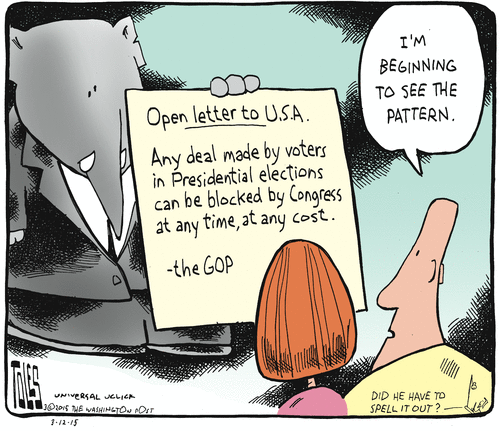by Ian Millhiser
Pro tip: if you want to win a Supreme Court case, it’s probably not a
good idea to compare a swing justice who could single-handedly decide
the case’s outcome to Confederate slaveholders.

The comparison between Justice Anthony Kennedy and defenders of a
right to hold other human beings in bondage arose after the Affordable
Care Act had a
much better day in the Supreme Court
than its opponents might have hoped for. Justice Kennedy, one of two
potential swing votes who could rescue the law from this latest attempt
to hobble one of its core provisions through litigation, warned that
there is a “serious constitutional problem” with the plaintiffs’
argument — and that this problem may drive Kennedy to uphold the law. As
a result, opponents of the law have
flooded opinion pages
and conservative outlets with articles criticizing the concerns Kennedy
raised during oral arguments in the anti-Obamacare case known as
King v. Burwell.
The latest in this genre is an article co-authored by two attorneys,
one of whom played a major role in the last lawsuit attempting to bring
down the Affordable Care Act, comparing Justice Kennedy’s doubts
regarding the plaintiffs’ arguments in
King to “
the heart of the Confederate states’ defense of slavery.”
David Rivkin, a former Reagan and Bush I administration official who
litigated the first challenge to the Affordable Care Act at the trial
level, and Elizabeth Foley, a law professor who authored a book on tea
party constitutionalism, draw this connection between Justice Kennedy
and defenders of one man’s right to own another in an article published
in
Politico Magazine. The article also blurs the line between two distinct legal doctrines and misreads the nature of Kennedy’s concerns.
The central premise of
King is that the Affordable Care Act
denies tax credits that enable millions of people to afford health
insurance to people who live in states where the federal government
operates the state’s Obamacare health exchange. Under the law,
states have “flexibility” to decide whether to set up their own exchange or have the federal government do so for them.
Should the Court agree with the
King plaintiffs that tax credits must be cut off in nearly three dozen states,
millions of people will lose their health insurance. According to one estimate, nearly
10,000 people will die every year
who otherwise would have lived. Premiums will double, triple, quadruple
or worse for millions of Americans, causing many healthy individuals to
drop coverage that they can no longer afford. And, as healthy consumers
drop coverage, insurers to will the revenues they need to continue
paying claims to their sick customers. In many states, the result could
be a “
death spiral” that eventually collapses the state’s individual insurance market.
This fear of a death spiral formed the basis of Kennedy’s objections to the
King
plaintiffs’ arguments. Citing a doctrine that prohibits federal laws
from coercing states into taking a particular action, Kennedy suggested
that the Court should avoid a reading of the Affordable Care Act that
would force states to choose between setting up a state-run exchange or
having their insurance markets collapse.
During the oral argument, several other justices pointed to a
different limit on congressional power. When Congress conditions the
payment of federal funds upon a state acting in a particular way, funds
cannot be denied to states that do not comply with this condition “
if a State is unaware of the conditions or is unable to ascertain what is expected of it.”
Some members of the Court expressed concerns that this limit, which is
often referred to as the “clear statement rule,” also casts
constitutional doubts on the plaintiffs’ reading of Obamacare.
In their
Politico piece, Rivkin and Foley appear unaware that Kennedy
raised coercion concerns and not clear statement concerns during the
King
oral argument, as their piece is primarily an argument for why Kennedy
and his colleagues should not allow the clear statement rule to stand in
the way of cutting off tax credits. The piece refers to a clear
statement argument raised by several law professors in an amicus brief,
and claim, incorrectly, that this clear statement argument “gained some
traction” with Justice Kennedy. They bring up slavery as part of an
argument that states rights concerns, including the concern that was
actually raised by Kennedy, should not apply to the Affordable Care Act.
The crux of their argument on this point is that cutting off tax
credits “hurts some citizens within those states” with federally-run
exchanges, but it does not actually deny funds to the state itself.
“[H]urting individuals within a state cannot be equated, under any
existing clear statement or other federalism case law,” according to
Rivkin and Foley, “with hurting states as sovereign entities.” This
distinction between federal laws offering a benefit to states and
federal laws offering a benefit to a state’s citizens then forms the
basis for a rhetorical flourish about slavery:
Incidentally, the last time the law professors’ argument
was seriously advanced was during the pre-Civil War era, when
Confederate states asserted that various federal government actions,
such as those devaluing a slave-owner’s property interest in his slaves,
harmed state sovereignty by harming the state’s citizens. Indeed, the
Nullification Crisis of 1832, the brainchild of Sen. John Calhoun of
South Carolina, was based on the argument that states didn’t have to
obey a federal tariff law because it harmed Southern farmers. This
political philosophy—that states are harmed when their citizens are
harmed in some way by the federal government—was the heart of the
Confederate states’ defense of slavery. We fought a Civil War to put this notion to rest.
Setting aside the two lawyers’ atypical understanding of why the
United States fought a Civil War, their suggestion that laws that hurt a
state’s citizens are not subject to either the clear statement rule or
the rule against coercion is mistaken. In explaining why there are
limits on how Congress can structure conditional grant programs, the
Supreme Court explained in
Pennhurst State School and Hospital v. Halderman that such legislation “is much in the nature of a contract.” Thus, for example, just as ordinary contract law provides that
ambiguous language in a contract is construed against the contract’s drafter,
an unclear federal law that may impose a condition on states will be
construed in the most favorable way for the states — i.e. it will be
read not to impose that condition.
Ordinary contract law principles, such as the rule that contracts are
construed against their drafter or another rule prohibiting “
unconscionable”
contracts, also do not evaporate because a contract benefits someone
who is not a party to the contract. If Mike agrees to pay Darius to
paint his home, these principles apply. Similarly, if Mike agrees to pay
Darius’s sister if Darius paints Mike’s home, these principles also
apply, even though Darius’s sister is not a party to the contract. It
follows that, if Congress were to offer to provide tax credits to a
state’s citizens if a state takes a particular action, the ordinary
constitutional rules governing clear statements and coercion also apply.
Ironically, if Justice Kennedy ultimately votes to uphold the
Affordable Care Act due to his concerns about coercion, the law’s
supporters may be able to thank Mr. Rivkin for this outcome. Prior to
2012, no Supreme Court decision had ever held that a federal law
violated the prohibition on coercion. That changed after the Court
decided
NFIB v. Sebelius,
the first Supreme Court case targeting Obamacare. That case relied on
the rule against coercion to give states greater leeway to opt out of
the Affordable Care Act’s Medicaid expansion.
The lawyer who original filed
NFIB and who litigated it at the trial level was David Rivkin.









 The White House
The White House









